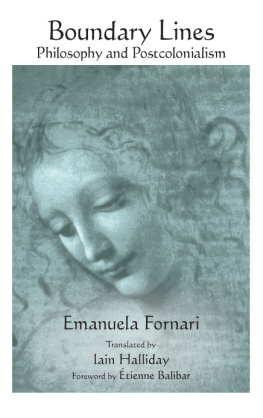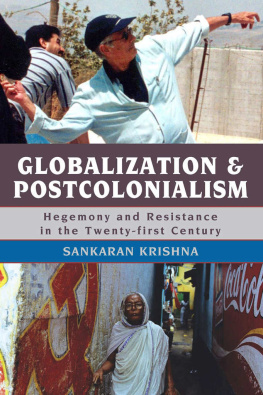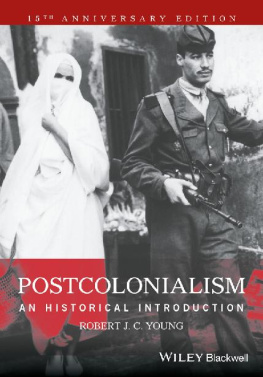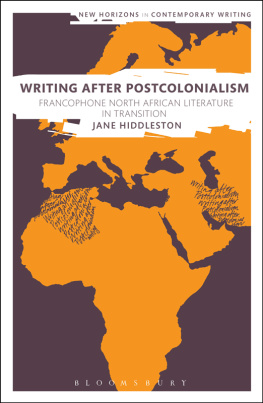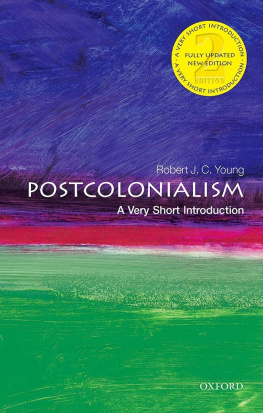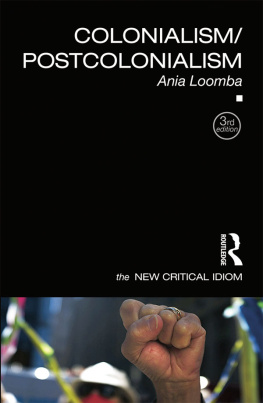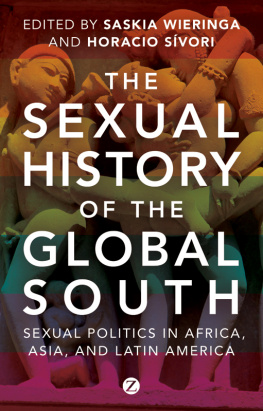Beginning postcolonialism

Beginnings
Series editors: Peter Barry and Helen Carr
Beginnings is a series of books designed to give practical help to students beginning to tackle recent developments in English, Literary Studies and Cultural Studies. The books in the series
demonstrate and encourage a questioning engagement with the new;
give essential information about the context and history of each topic covered;
show how to develop a practice which is up-to-date and informed by theory.
Each book focuses uncompromisingly upon the needs of its readers, who have the right to expect lucidity and clarity to be the distinctive feature of a book which includes the word beginning in its title.
Each aims to lay a firm foundation of well understood initial principles as a basis for further study and is committed to explaining new aspects of the discipline without over-simplification, but in a manner appropriate to the needs of beginners.
Each book, finally, aims to be both an introduction and a contribution to the topic area it discusses.
Also in the series
Beginning theory (2nd edition)
Peter Barry
Beginning film studies
Andrew Dix
Beginning realism
Steven Earnshaw
Beginning ethnic American literatures
Helena Grice, Candida Hepworth,
Maria Lauret and Martin Padget
Beginning Shakespeare
Lisa Hopkins
Beginning postmodernism
Tim Woods
Beginning postcolonialism
Second edition
John McLeod

Copyright John McLeod 2000, 2010
The right of John McLeod to be identified as the author of this work has been
asserted by him in accordance with the Copyright, Designs and Patents Act 1988.
First edition published 2000 by Manchester University Press
This edition published 2010 by Manchester University Press
Oxford Road, Manchester M13 9NR, UK
and Room 400, 175 Fifth Avenue, New York, NY 10010, USA
www.manchesteruniversitypress.co.uk
Distributed in the United States exclusively by
Palgrave Macmillan, 175 Fifth Avenue, New York,
NY 10010, USA
Distributed in Canada exclusively by
UBC Press, University of British Columbia, 2029 West Mall,
Vancouver, BC, Canada V6T 1Z2
British Library Cataloguing-in-Publication Data
A catalogue record for this book is available from the British Library
Library of Congress Cataloging-in-Publication Data applied for
ISBN 978 0 7190 7858 3 paperback
This edition first published 2010
The publisher has no responsibility for the persistence or accuracy of URLs for any external or third-party internet websites referred to in this book, and does not guarantee that any content on such websites is, or will remain, accurate or appropriate.
Typeset in Ehrhardt
by Action Publishing Technology Ltd, Gloucester
Printed in Great Britain
by Bell & Bain Ltd, Glasgow
For my parents,
Veronica and James McLeod
Contents
Acknowledgements
Since the first edition of Beginning Postcolonialism appeared in 2000 I have been fortunate to meet many students and scholars who have kindly offered me their views on its strengths and weaknesses. I have endeavoured to use their advice in preparing this second edition, and I am very grateful to them for their generosity and candour. My own thinking as regards postcolonialism remains indebted to the friendship and conviviality of many postcolonial scholars and writers whom Id like to thank for sharing with me their expertise and wisdom: Elleke Boehmer, Sarah Brouillette, Maurizio Calbi, Isabel Carrera Surez, Claire Chambers, Shirley Chew, Laura Chrisman, Stef Craps, Sandra Courtman, Pilar Cuder, Nic Dunlop, Sam Durrant, Bernardine Evaristo, Luz Mar Gonzlez Arias, David Farrier, Francesca Giommi, Dave Gunning, Caroline Herbert, Graham Huggan, Ananya Jahanara Kabir, Tsunehiko Kato, Michelle Keown, Joel Kourtti, Bndicte Ledent, Gail Low, Beln Martn-Lucas, Judith Misrahi-Barak, Anshuman Mondal, Bart Moore-Gilbert, Peter Morey, Stephen Morton, David Murphy, Stuart Murray, Susheila Nasta, Brendon Nicholls, Jopi Nyman, Melanie Otto, Caryl Phillips, Sandra Ponzanesi, James Procter, Ato Quayson, Alan Rice, David Richards, Gemma Robinson, Mark Shackleton, Neelam Srivastava, Mark Stein, John Thieme, Sara Upstone, Rashmi Varma, Abigail Ward, Andrew Warnes, Janet Wilson and Bruce Woodcock. A special thank you is due to Peter Barry for involving me in the Beginnings series, and also to Manchester University Presss Matthew Frost for entrusting me with the responsibility of writing this book and for his unique support over many years (especially on Friday 25 August, 2000, Helsinki, Finland).
Friends, colleagues and my family have endured my life-long passion for postcolonialism with patience and good cheer. Thanks in particular to Richard Brown, Lucy Evans, Alberto Fernndez Carbajal, Tracy Hargreaves, Rick Jones, Katy Mullin, Alex Nield, Francis OGorman, Matthew Pateman, Martin Rushworth, Alistair Stead, Mark Taylor-Batty, Ceri Thomas and Agnes Woolley. I am especially grateful to Colin and Margaret Adams for their enthusiasm, encouragement, and the gift of Burnham Market, while the aptly named Joys are a constant source of support: Linda, Brian, Caitlin, Lydia and Madeleine. My parents, Veronica and James McLeod, remain the people whom I admire the most. This book is for them, with love.
Finally, I must thank Julie Adams for playing a major role in the preparation of this second edition.
John McLeod
University of Leeds
Preface to the second edition
It is a rare privilege to publish any book, but especially one which is intended to welcome new readers to a field of study that has fascinated and inspired me over many years. It is rarer still to be given the opportunity to revise a book for a second edition, and I have both enjoyed and been daunted by the exciting challenge of revisiting and refreshing Beginning Postcolonialism. In the ten years that have passed since I finished the first edition, postcolonialism has cemented its place within a wide range of academic disciplines, while the creative endeavours of postcolonial writers, artists and thinkers have become increasingly familiar beyond a strictly academic context and today sit firmly in the vanguard of contemporary literature, music, film and many other spheres besides. But this has not necessarily meant an increase in the acceptance, or the understanding, of postcolonial cultures and their critique, and there remains more than a degree of resistance to the insights and vocabularies of the postcolonial. When a critic as astute as Bruce King writes that postcolonialism became fashionable in the academy as part of the culture wars that followed the battle over Vietnam and has subsequently lost touch with the basis of the great migration of the worlds people (The Oxford English Literary History, Volume 13, 19482000: The Internationalization of English Literature, Oxford University Press, 2004, due to the greater number of useful books available which engage with it, but harder because of the misunderstandings and hostility regarding its significance which circulate and which are partly due to the ways in which postcolonialism continues to take issue with several central ideas beloved of certain critics.
In preparing this second edition I have tried to give a sense of the continuing debates about postcolonialism while seeking to anchor some of its key themes and vocabularies securely for its readers. But I have also tried not to change too much, partly because most readers of the first edition I have met have tended to speak positively of the books organisation, content and approach, but also because the impact of much of the late-twentieth-century discussions of postcolonialism are no less important today and still require our cognisance as we make our beginnings in the field. That said, in each chapter I have incorporated new materials where appropriate, mostly in the spirit of updating, finessing and extending the ways in which key ideas might be articulated. I have also taken the chance to correct some errors of fact and spelling which appeared in the first edition (I dont think I shall ever live down spelling Tasmania with a z), and I have also attempted to engage with some central postcolonial ideas with greater sharpness, fluency and accuracy I was never very happy with the account of the ideas of mimicry and ambivalence in colonial discourses that I gave the first time around, and also I wanted to capture better Fanons sense of national culture and national consciousness this time around. These and certain other passages in the book have, I hope, been tightened up, to the benefit of the book as a whole. Readers familiar with the first edition of
Next page


